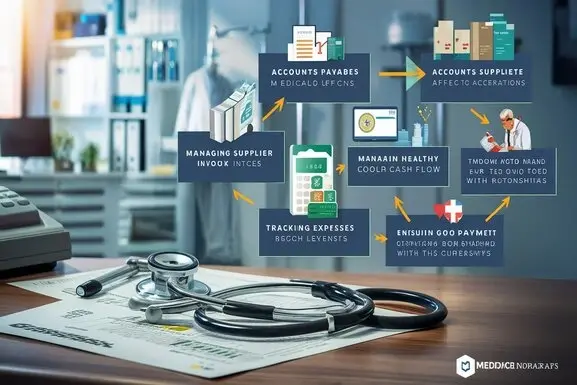How Do Accounts Payable Affect A Medical Office?

Accounts payable of a medical office concern the amounts that the practice has to pay to outside vendors and suppliers. Accounts payable management is one of the most important aspects that need to be well managed to ensure that a medical practice organization achieves its objectives of controlling costs, maintaining a positive cash flow, and achieving operational stability.
Here, we discuss some of the most significant effects of accounts payable in medical offices.
Expense Tracking
The accounts payable therefore give a summary of the medical practice’s obligations and expenditure. This means that, through tracking accounts payable, the office managers can identify some of the large expenses for the practice which include medical supplies, equipment, and utilities among others. This is crucial for tracking expenses while creating a realistic budget and avoiding overspending. It also enables practices to detect such areas where there is likely to be avoidable spending and hence minimize it.
Cash Flow Issues
If the cost of accounts payable increases at a faster pace than the amount of income and accounts receivable, it becomes a pressure on cash flow. Medical offices of all types must be able to count on a steady stream of cash to pay salaries, stock up on paper clips, and cover utilities. This is because when the accounts payable expenses accumulate too quickly then this affects the available cash. This results in considerably constrained cash flow that affects daily operations and business sustainability. It is thus important to keep a check on the accounts payable to ensure that enough cash is available at all times.
Prioritizing Bill Payment
Organizations with tight cash flow conditions that include vast accounts payable expenses may have to prioritize bill payments depending on the most exigent. For instance, the accounts payable may include payroll, rent, or mortgage, and basic medical necessities may be considered more important than accounts such as financing of new equipment. Companies with cash flow issues may also need to set up payment terms with vendors for non-critical accounts payable. Being able to properly manage and prioritize payment can prevent unnecessary late fees and penalties that may be involved.
Supply Chain Disruption
If a medical office does not make the accounts payable invoice payments on time, then the suppliers of services or goods may cease to provide their services or products on credit. The accounts payable system gives important information regarding the due dates that are expected to make payments. Prompt and timely payment to suppliers and vendors enables the medical office to have a good supplier relationship and a better supply chain. Failure to monitor the accounts payable leads to delayed payments and results in suspension of delivery of medical necessities.
Credit Score Damage
Patients may use sound business or personal credit scores to finance some key purchases like sophisticated medical equipment or properties. However, failure to pay invoices to the accounts payable at the right time can harm the credit rating of the medical business and the physician owners. This sort of effect on credit scores can influence things such as interest rates and the approval for financing. For physicians, it may even cost them their credentialing with insurance networks, which is not a joke. This risk is, however, minimized through proper accounts payable management.
Higher Borrowing Costs
Besides credit score effects, outstanding payments can suggest to creditors that a medical practice has a cash flow problem. Therefore, the office may be given a less preferable rate of interest or higher conditions for borrowing money. This makes access to capital to expand the business, recruit employees, or upgrade machinery costly. Control of accounts payable balances is important in medical offices so that they can maintain a good credit standing and borrowing powers.
Lost Early Payment Discounts
Some of the medical equipment suppliers and distributors also have intermediaries in the form of Group Purchasing Organizations that offer early payment discounts on the invoices. For instance, a supplier may offer a 2% discount on the total amount if the medical office clears the accounts payable amount within 10 days instead of 30. These early payment discounts are beneficial to medical offices since they are often operating on slim margins in the healthcare field. This is because the practice can only exploit these discounts through efficient and well-coordinated accounts payable operations.
Regular Financial Reporting section
Accounts payable is an important component of total assets and represents money owed to the medical office for goods or services that have not yet been paid. This reporting helps the owners of practices and partners to get insights into budget differences, profitability, and available cash. Fluctuations in the accounts payable should raise suspicion and require investigation by the management. Unmonitored accounts payable may translate into enormous debts for the practice, which is not easy to manage.
The following are some of the effective and sustainable policy measures that need to be followed in medical offices: This means that practices need to be keen on the spending commitments, time of payment as well as reporting to help in the control of expenses as well as improving financial health. Therefore, when medical offices have a keen watch on accounts payable, they can enhance the generation of cash flow, credit, and the supply chain.
Contact us here for Accounts Payable Services now!

